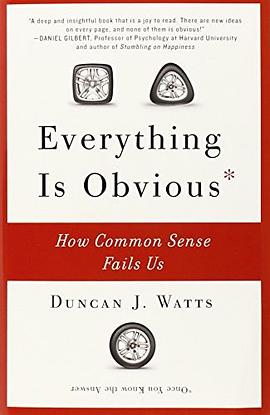

具体描述
Why is the Mona Lisa the most famous painting in the world? Why did Facebook succeed when other social networking sites failed? Did the surge in Iraq really lead to less violence? How much can CEO’s impact the performance of their companies? And does higher pay incentivize people to work hard?
If you think the answers to these questions are a matter of common sense, think again. As sociologist and network science pioneer Duncan Watts explains in this provocative book, the explanations that we give for the outcomes that we observe in life—explanation that seem obvious once we know the answer—are less useful than they seem.
Drawing on the latest scientific research, along with a wealth of historical and contemporary examples, Watts shows how common sense reasoning and history conspire to mislead us into believing that we understand more about the world of human behavior than we do; and in turn, why attempts to predict, manage, or manipulate social and economic systems so often go awry.
It seems obvious, for example, that people respond to incentives; yet policy makers and managers alike frequently fail to anticipate how people will respond to the incentives they create. Social trends often seem to have been driven by certain influential people; yet marketers have been unable to identify these “influencers” in advance. And although successful products or companies always seem in retrospect to have succeeded because of their unique qualities, predicting the qualities of the next hit product or hot company is notoriously difficult even for experienced professionals.
Only by understanding how and when common sense fails, Watts argues, can we improve how we plan for the future, as well as understand the present—an argument that has important implications in politics, business, and marketing, as well as in science and everyday life.
作者简介
邓肯·J. 瓦茨
1. 小世界网络之父,网络科学奠基人之一。雅虎研究院和微软研究院首席科学家。哥伦比亚大学教授,影响全世界的康奈尔大学“A.D.怀特博文讲座教授”。宾夕法尼亚大学工程学院、传播学院和沃顿商学院教授,横跨工程学、商学、社会科学三大领域。
[译者简介]
吕琳媛
1. 电子科技大学教授,国家优秀青年科学基金获得者,主要从事网络信息挖掘与社会经济复杂性方面的研究,入选2018年《麻省理工科技评论》“中国35岁以下科技创新35人”。
目录信息
读后感
《反常识》教你如何用“反常识思维”应对复杂世界。丹尼尔·卡尼曼在《思考,快与慢》中说到,人有两种思维系统1和系统2,其实系统1就是“常识”,系统2更多的就是“反常识”,需要通过思考、复杂的计算来得出结论。大多数情况我们用系统1也就是“常识”思考就够了,比如今天穿...
评分人们会根据自己已有的人生经历,总结出大量常识,有些常识,在物理、化学这样受环境影响可控的情况下,可以准确描述类似事件的结果,并且我们可以通过严格控制变量的反复实验验证其中某个因素对结果的影响。 比如:忽略空气阻力时的两个铁球同时落地 比如:抽真空后,羽毛和铁...
评分 评分常识对于我们个人的生活,起到的作用无可替代。期中的因果思维、光环效应、关键影响人理论……都是基于我们个人的常识演绎或推导出来的。这些常识在现如今的复杂多变的系统中起到的作用却非常有限,而我们却有意无意的忽略了这点。 一、因果与相关性 当A在B之前发生,那么A就是...
评分生活中,我们有个词汇,叫“马后炮”,专指一些后见之明的、事后诸葛的家伙。 作为平凡老百姓,我们可以坦然面对这种缺陷,并且一笑了之。但如果说,在严谨的社会学研究界,也大量充斥着很多的马后炮,就不能不让人惊讶了,毕竟,这些家伙可是专业人士啊。 恰恰是专业人士...
用户评价
我特别欣赏作者在处理论证时所展现出的那种近乎严苛的自我约束力。在全书中,我几乎找不到任何带有情绪化色彩的断言,或者那种为了迎合读者而设置的廉价的鼓动性口号。所有的观点都建立在扎实的观察和严谨的逻辑推演之上,即使是那些看似挑战常识的论点,作者也会先将其置于显微镜下,用冷静、审慎的态度进行剖析。这种克制,反而赋予了这本书巨大的力量。它不试图说服你,而是提供工具和框架,让你自己去进行构建和拆解。读完之后,我没有产生那种“被告知了答案”的满足感,而是一种“我似乎理解了思考过程”的豁然开朗。这更像是一本关于方法论的指南,而不是一本提供结论的教科书,它鼓励的是一种持续性的、批判性的自我审视,这份价值远远超越了任何单一的论点。
评分内页的排版简直是一场对阅读体验的极致尊重。作者在处理长篇论述时,并没有选择当前流行的紧凑式布局,而是坚持使用了宽阔的页边距,这不仅极大地缓解了阅读疲劳,更重要的是,它为读者的思绪留下了宝贵的“呼吸空间”。每当读到一个关键的转折点或一个需要深入思考的论点时,我总能感觉到那种充裕的留白仿佛在无声地邀请我停下来,将自己的想法投射到空白之处。纸张的选择也十分考究,并非那种刺眼的雪白,而是微微泛黄的米白,这种色调让墨水显得格外柔和,即便是长时间阅读,眼睛也不会感到任何不适。更让我惊喜的是,书中穿插的一些插图——如果可以称之为插图的话——更像是精心设计的图表或示意图,它们不以装饰为目的,而是作为概念的具象化工具,线条的精细度令人赞叹,即便是不懂其具体含义,也能感受到制作者对精确性的执着追求。这本书的物理形态本身,就是对“慢阅读”时代的一种致敬。
评分这本书的语言风格是一种极其优雅的、古典主义式的散文体,但其内核却充满了对当下世界的敏锐洞察。作者似乎非常偏爱使用长句,每一个句子都像一串精巧的、层层嵌套的子句结构,充满了从句和修饰语,仿佛在试图用一个完整的句子来描摹一个复杂多维度的概念,不遗漏任何一个细微的层次。这种对语言复杂性的拥抱,使得阅读过程成了一种智力上的挑战,我常常需要停下来,回溯前一句,才能完全理解当前正在阐述的逻辑分支。然而,尽管句子结构复杂,作者的词汇选择却始终保持着一种令人惊叹的清晰度和准确性,没有丝毫的故作高深或故弄玄虚。他似乎拥有一种将最抽象的概念,用最精确的词语包裹起来的能力,使得那些原本飘渺的思绪,获得了坚实的落脚点,这是一种真正的大师级语言驾驭。
评分这本书的封面设计简直是一场视觉的盛宴,那种深邃的靛蓝色背景下,浮现出复杂交织的几何线条,仿佛在暗示着某种宇宙深处的秩序与混沌。我花了足足十分钟,仅仅是盯着那个标题的字体排版——它没有采用任何张扬的衬线或无衬线字体,而是用一种极其克制、近乎手刻的风格呈现,每一个笔画的粗细变化都蕴含着某种微妙的平衡感。装帧的材质也值得一提,那种略带磨砂质感的硬壳,握在手里,有一种沉甸甸的、值得信赖的感觉,让人忍不住想要立刻翻开它,探究其内里究竟隐藏着何种精妙的论述。我原本以为这会是一本晦涩难懂的哲学著作,但书脊上那句若隐若现的引言,却带着一种令人安心的日常口吻,形成了一种强烈的反差,让我对即将展开的阅读之旅充满了好奇和期待。它在书架上,就像一座沉默的灯塔,用它低调的奢华和深沉的内敛,吸引着所有路过的目光,让人忍不住想去触碰它,感受那份工艺的温度。
评分故事的叙事节奏极其舒缓,它不急于抛出结论,而是像一位经验丰富的导游,耐心地引导读者穿梭于一系列看似毫不相关的历史片段与现代观察之间。初读时,我甚至有些困惑,因为作者似乎总是在绕着弯子说话,从一个古老的民间传说跳跃到最新的神经科学研究,再到某个十九世纪作家的书信。这种看似松散的结构,却在不知不觉中,编织出了一张巨大的思维之网。随着阅读的深入,我开始领悟到,作者的真正目的并非是要建立一个线性、线性的因果链条,而是要展示事物之间那些隐藏的、非直观的关联性。每一次的跳跃,都是一次视角(perspective)的切换,强迫我打破既有的认知框架。这种写作手法,需要读者投入极大的耐心和专注力,它奖励那些愿意跟随作者进行深度思考的探索者,而不是那些只寻求简单答案的快速浏览者。
评分 评分 评分 评分 评分相关图书
本站所有内容均为互联网搜索引擎提供的公开搜索信息,本站不存储任何数据与内容,任何内容与数据均与本站无关,如有需要请联系相关搜索引擎包括但不限于百度,google,bing,sogou 等
© 2026 book.wenda123.org All Rights Reserved. 图书目录大全 版权所有




















